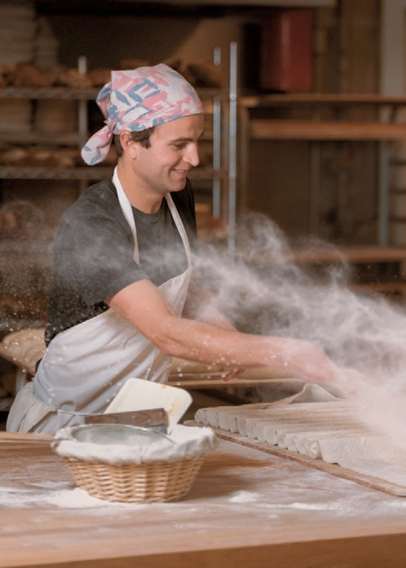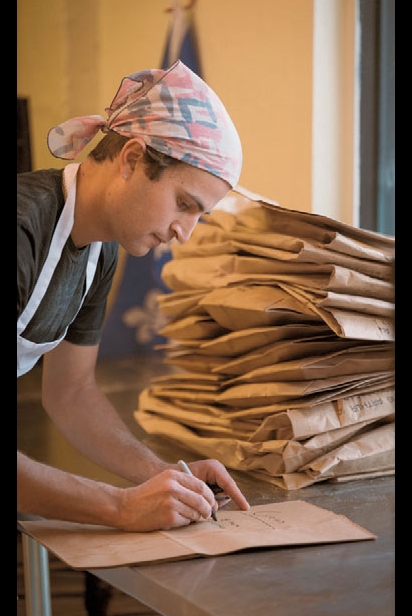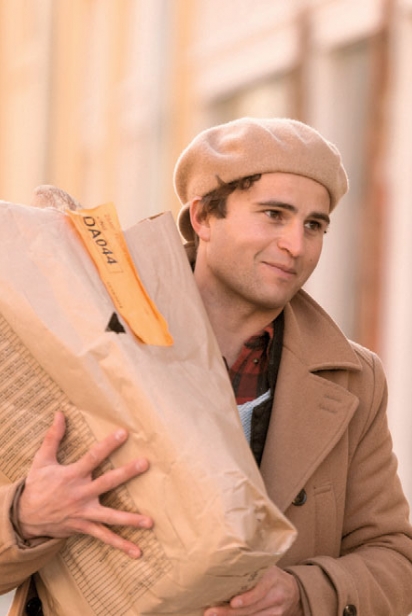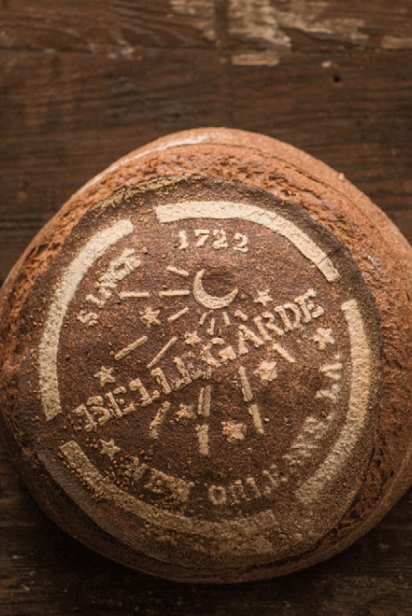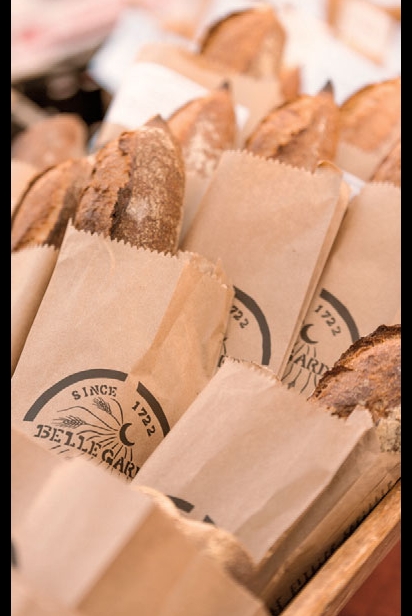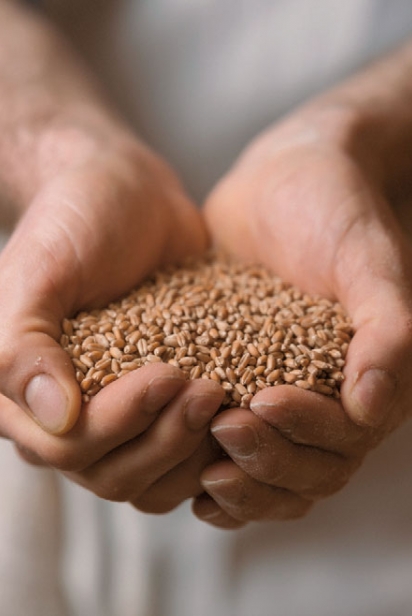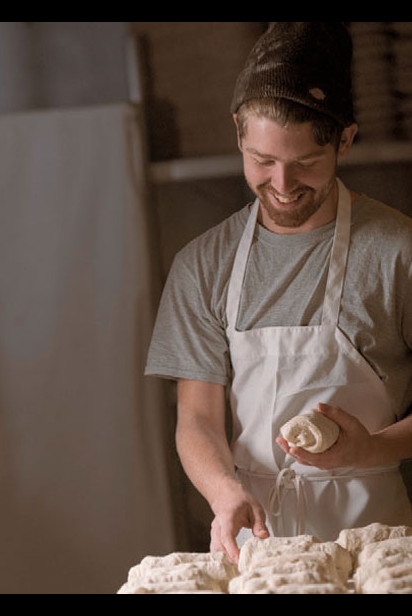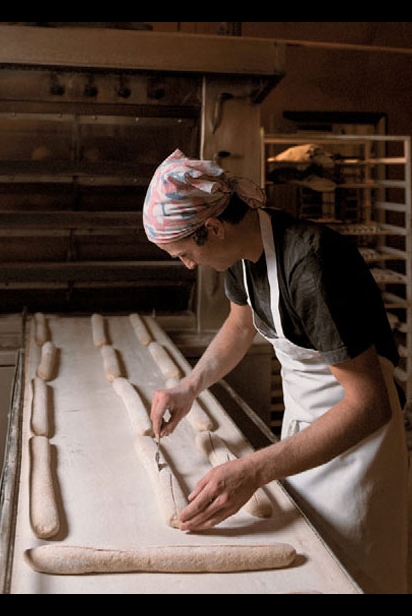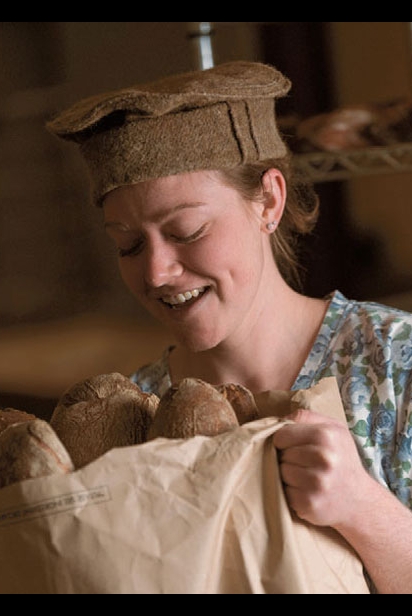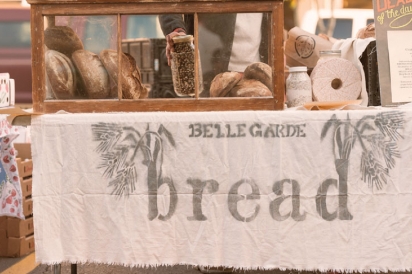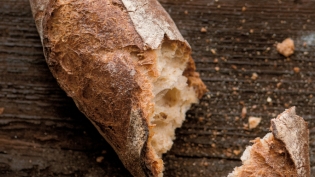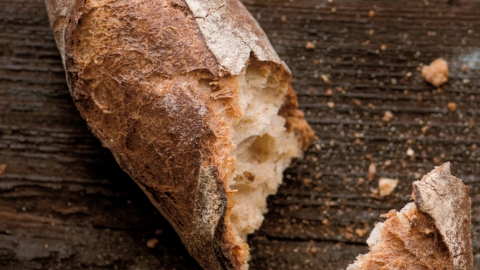Early to Rise: Brilliant Bread Starts Before Dawn at Bellegarde Bakery
Graison Gill wakes up at 2am on Saturday morning to bake your bread. The farmers market doesn’t open for another six hours, but what’s about to happen takes good time. The process is a little bit magic, a little bit meditation and a little bit métier.
You see, to Gill, the 27-year-old California native turned New Orleans baking bastion and owner of Bellegarde Bakery, baking your daily bread is hardly about paying the bills. It’s a spiritual and philosophical commitment to honoring wisdom from generations past through the rewarding, daily work of nourishing the community.
And the commitment shows. Taste any of Bellegarde’s diverse, traditional and innovative breads and you’ll instantly understand why Gill obsesses over the history, chemistry and nutrition of his craft. Even in our current artisan bakery boom in New Orleans, Bellegarde’s breads stand apart from the rest. The country miche sourdough rounds, seasonal kasha baguettes, traditional ciabatta loaves and southern fougasse with local cracklins (just to name a few) are all hand-mixed, long-fermented, hand-shaped and hand-baked with mostly local, whole-grain flour that is hand-milled in the intimate bakery on Toledano Street—and that’s not by mistake.
One thing Gill loves to talk about while baking is that bread should reflect the dexterity and decisions of the baker as a craftsman. As Gill puts it, “The baker, a mere poet, molding the most elemental properties of life through the most pious process. Grain, brick, fermentation, salt, water—the primordial effort of a passionate man. A gentle lapidary of hand and mind, rote yet regal, profound in the simplicity of its desire. As God gathered Adam as clay in His palm, He blew dust to life just as Adam blew grain to flour, and flour to life. In feeble loaves we create God’s image of Us; we iterate our prayer, our labor. Our labor is our prayer. Today’s dough perpetuating tomorrow’s loaves.”
Gill arrived in New Orleans at age 21 on a Greyhound bus after being lured down by a friend during a particularly bad winter up north. Before moving down, he only had limited home baking experience, but his migration to New Orleans cultured a passion, philosophy and talent for baking hand-hewn breads that quickly turned him into a young entrepreneur baking out of the now-famous Delicious Cooperative Kitchen incubator in the Bywater and selling, amongst other places, at the Crescent City Farmers Market.
As his business grew, so did his dedication to the ancient craft of hand baking and his philosophical analysis of the agro-industrial global food system. This curiosity and burgeoning experience led him to apprentice under a handful of well-respected bakers around the country from Vermont to California, meeting extraordinary farmers, mill-builders and oven masons along the way.
He returned to New Orleans to open Bellegarde Bakery—named after the first recorded commercial bakery in New Orleans back in 1722—with a mission of resurrecting the great baking culture in the underappreciated bread bowl that we call New Orleans.
Born part from his love for traditional cooking and baking passed down from his Belgian grandmother and part from the spite of such a great food region honoring the tasteless, white, nutrient-poor po-boy loaf as its flagship bread, Gill opened Bellegarde with a vision: bake extraordinary, diverse breads with local, wholesome ingredients in traditional ways.
Gill found a third-hand steam-injection deck oven in Arizona and took months to locate the parts he needed to ship it and put it together in the back of his 2,500-square-foot two-room bakery in Broadmoor. The bakery is spare and virtually unmarked (unless you count the faded lettering from the old seafood business that used to inhabit the space), with a front room for mixing, shaping and proofing loaves, a back room with the stone grain mill and the oven and a walk-in cooler in which to store dough overnight. The entire operation was set up and operational for less cash than most commercial bakeries spend on their oven alone.
Part of the work of setting up the new bakery was doing some research. Gill happened upon a set of research papers collected by a Tulane professor in the 1950s titled The Baking Industry in Old New Orleans that, pieced together with other historical documents, painted the picture of our region’s earliest commercial breads.
From the founding of New Orleans until the mid 1800s (that’s nearly 200 years, for those of you counting) when the Great Plains began consistently producing wheat, milling it and shipping it down the Mississippi, New Orleans bakers had a challenging task. Despite local experiments with wheat—including one in Faubourg Saint John in 1708—wheat was not yet widely grown in the early United States. Thus, a baker’s supply of wheat flour was dependent upon what made it across the Atlantic on trade ships without going rancid, so the supply was inconsistent both in amount and in quality. That meant that the patchwork of local bakers had to find local substitute grains.
Of course, the most famous cereal grains grown in southern Louisiana were corn and rice along with lesser amounts of amaranth, millet and sorghum, so many of New Orleans’ earliest breads were a patois of various grain flours. In an era where bread was a daily necessity rather than a luxury, our earliest bakers had to find a way to craft a nutrient-dense, viable product against the odds. Without climate control or refrigeration in our unpredictable, humid climate, those bakers had to be masters of the primordial ingredients—grain, water and salt—adjusting their fermentation processes accordingly in order to yield edible loaves.
A little later in the city’s history, New Orleans peaked with over 250 bakeries baking a plethora of nutritional, flavorful breads with influences as diverse as New Orleans’ roots. The extensive network of bakeries was supported by a thriving local food economy at restaurants, retail stores, and at the 42 city-owned markets that used to be a staple of every neighborhood (the Saint Roch Market on Saint Claude Avenue is one of the many buildings that used to house these local food hubs).
Many of the bakeries throughout the state operated community ovens, a tradition passed down to modern New Orleans (and greater Louisiana) both from local indigenous American communities and from communities throughout Europe. Since our hot, humid region didn’t normalize household ovens until the advent of the gas range, some local bakers would fire their ovens and host regular community hours where local families could bring in their weekly loaves to bake for a small cost. Others, like the old United Bakery on Saint Bernard Avenue, would open their ovens for community use during feast days like Saint Joseph’s Day to prepare the ceremonial breads for the altars.
All of these factors contributed to the rich, varied and strong local food culture that so defined New Orleans and greater Acadiana for the majority of its history. Yet, you look around the city for the past nine decades and you see that rich network of healthy, diverse and vibrant neighborhood bakeries eroded by the introduction of industrialized, white breads that have reigned king since the 1920s.
Inspired by this rediscovered history, Gill began networking. He tracked down growers of landrace wheat and other heirloom grains that traditionally thrive in our region, now acquiring most of his whole grains between Louisiana and the Texas Blacklands around Austin; he purchased a small, three-horsepower, pink granite stone mill to mill his own flour out of the best wheat berries and grains he could acquire; he even recently negotiated a deal to use local Avery Island salt; and he took all this goodness and started talking to people—shoppers at the weekly farmers markets and local chefs and restaurateurs—about what good, local bread could and should be.
It’s been seven years since Graison Gill began baking in New Orleans, and the word continues to reach more and more faithful customers. Now, on a slow day, Gill and his team of three bakers and two drivers bake and deliver 300 loaves a day to grocery stores, farmers markets and restaurants throughout the city, each and every loaf crafted and cared for by hand from start to finish.
Gill has recently been pairing up with the likes of Saint James Cheese Company, Cleaver & Co. and NOLA Brewing both to teach classes about his craft and to collaborate on special projects. In fact, Bellegarde, Saint James and Cleaver are now collaborating on a new stall at the French Market called Continental Provisions that brings together their connections with local farmers and their three artisanal crafts.
You can also track down Bellegarde’s remarkable breads at Whole Foods, Hollygrove Market, the New Orleans Food Co-op and various specialty food stores and restaurants throughout the city. Even with all the new expansions, you’ll still find Bellegarde at the Saturday morning Crescent City Farmers Market, where you’ll often find Graison himself eager to share his life’s work with you.
In between customers, Gill turns to me and says, “Last week we lowered the price on the breads with our home-milled flour in it because we believe that getting the best stuff into people’s hands is what’s most important, not our profit margin.”
It’s that dedication to craft and community that gives Bellegarde breads the extra flavor that make them one of the most remarkable bakeries in New Orleans.
You can find Bellegarde Bakery breads at the Saturday Crescent City Farmers Market as well as at Whole Foods, Rouses, Saint James Cheese Company, the New Orleans Food Co-op and various specialty food stores and restaurants throughout the city. Their new stall, Continental Provisions, at the French Market with Saint James Cheese Company and Cleaver & Co. meats, opened this past Christmas. Read more about Bellegarde at BellegardeBakery.com.


